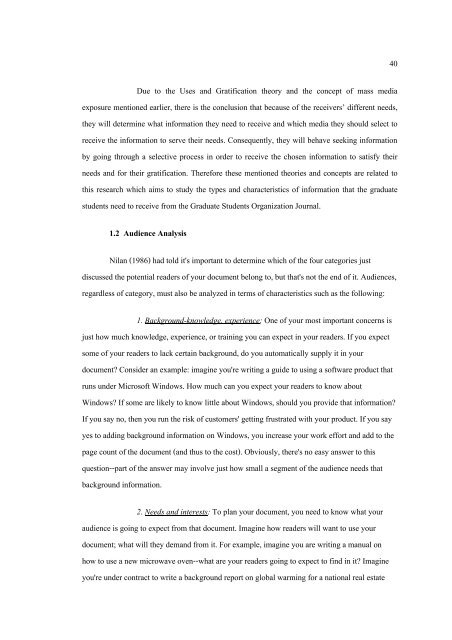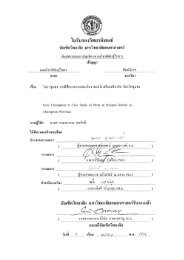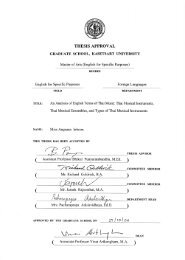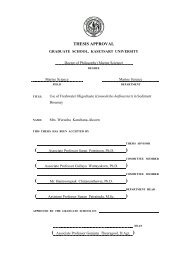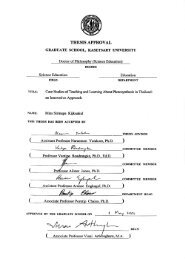Graduate Students of Kasetsart University
Graduate Students of Kasetsart University
Graduate Students of Kasetsart University
Create successful ePaper yourself
Turn your PDF publications into a flip-book with our unique Google optimized e-Paper software.
Due to the Uses and Gratification theory and the concept <strong>of</strong> mass media<br />
exposure mentioned earlier, there is the conclusion that because <strong>of</strong> the receivers’ different needs,<br />
they will determine what information they need to receive and which media they should select to<br />
receive the information to serve their needs. Consequently, they will behave seeking information<br />
by going through a selective process in order to receive the chosen information to satisfy their<br />
needs and for their gratification. Therefore these mentioned theories and concepts are related to<br />
this research which aims to study the types and characteristics <strong>of</strong> information that the graduate<br />
students need to receive from the <strong>Graduate</strong> <strong>Students</strong> Organization Journal.<br />
1.2 Audience Analysis<br />
Nilan (1986) had told it's important to determine which <strong>of</strong> the four categories just<br />
discussed the potential readers <strong>of</strong> your document belong to, but that's not the end <strong>of</strong> it. Audiences,<br />
regardless <strong>of</strong> category, must also be analyzed in terms <strong>of</strong> characteristics such as the following:<br />
1. Background-knowledge, experience; One <strong>of</strong> your most important concerns is<br />
just how much knowledge, experience, or training you can expect in your readers. If you expect<br />
some <strong>of</strong> your readers to lack certain background, do you automatically supply it in your<br />
document? Consider an example: imagine you're writing a guide to using a s<strong>of</strong>tware product that<br />
runs under Micros<strong>of</strong>t Windows. How much can you expect your readers to know about<br />
Windows? If some are likely to know little about Windows, should you provide that information?<br />
If you say no, then you run the risk <strong>of</strong> customers' getting frustrated with your product. If you say<br />
yes to adding background information on Windows, you increase your work effort and add to the<br />
page count <strong>of</strong> the document (and thus to the cost). Obviously, there's no easy answer to this<br />
question--part <strong>of</strong> the answer may involve just how small a segment <strong>of</strong> the audience needs that<br />
background information.<br />
2. Needs and interests: To plan your document, you need to know what your<br />
audience is going to expect from that document. Imagine how readers will want to use your<br />
document; what will they demand from it. For example, imagine you are writing a manual on<br />
how to use a new microwave oven--what are your readers going to expect to find in it? Imagine<br />
you're under contract to write a background report on global warming for a national real estate<br />
40


